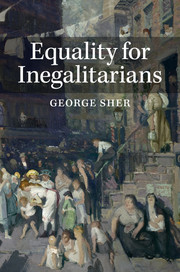Book contents
- Frontmatter
- Contents
- Preface
- Chapter 1 Reconciling equality and choice
- Chapter 2 Luck as the absence of control
- Chapter 3 Equality, responsibility, desert
- Chapter 4 The monistic turn
- Chapter 5 Why we are moral equals
- Chapter 6 Completing the turn
- Chapter 7 Coping with contingency
- Chapter 8 Enough is enough
- Chapter 9 From sufficiency to equality
- Bibliography
- Index
- References
Chapter 7 - Coping with contingency
Published online by Cambridge University Press: 05 August 2014
- Frontmatter
- Contents
- Preface
- Chapter 1 Reconciling equality and choice
- Chapter 2 Luck as the absence of control
- Chapter 3 Equality, responsibility, desert
- Chapter 4 The monistic turn
- Chapter 5 Why we are moral equals
- Chapter 6 Completing the turn
- Chapter 7 Coping with contingency
- Chapter 8 Enough is enough
- Chapter 9 From sufficiency to equality
- Bibliography
- Index
- References
Summary
To render its members able to live their lives effectively, a society must allow their choices to play out in ways that leave different people with different amounts of various goods – including, sometimes, the good of being able to live effectively itself. This is the connection between distributive equality and choice-related inequality that luck egalitarians rightly discern but wrongly analyze and defend. But what, beyond being able to make choices that stick, does the ability to live one's life effectively involve, and to what level of it must societies elevate their citizens?
I
It is important to bear in mind that what we are after is not an analysis of some antecedently understood notion of effectiveness. As I am using it here, the phrase “living one's life effectively” is a term of art. Its function is to designate whichever dimension of the kind of life into which a normal human being's consciousness channels him (a) is not automatically present in every such life, but (b) bears a relation to what is automatically present that warrants its inclusion in each person's fundamental interest. In the previous chapter, I suggested that our lives must contain some such dimension because the activities into which our consciousness channels us incorporate standards of success that are not automatically met. But what, exactly, are those standards, and to what interests do they give rise?
- Type
- Chapter
- Information
- Equality for Inegalitarians , pp. 112 - 131Publisher: Cambridge University PressPrint publication year: 2014



